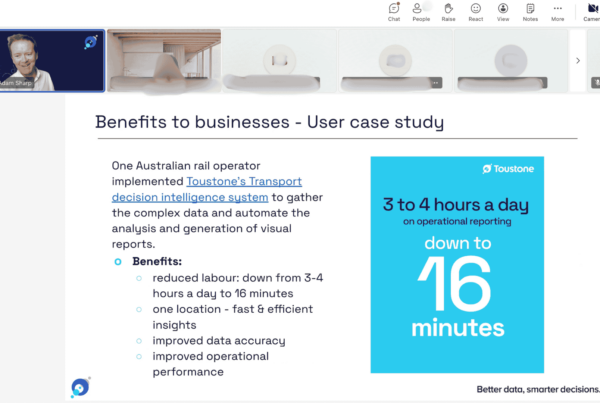The global demand for the business intelligence market was valued at USD 33.36 billion (AUD 50.4 billion) in 2023, and is expected to reach USD 65.25 billion (AUD 98.63 billion) by 2032 – growing at a compound annual growth rate (CAGR) of 7.74% between 2023 and 2030. With this increased demand in the market, it is no wonder business intelligence is evolving and we are now seeing the next step – decision intelligence.
The two terms ‘business intelligence’ and ‘decision intelligence’ can often be used interchangeably and it gets confusing. As part of Toustone’s ‘Data, Analytics & AI’ education series, Services Delivery Director and Co-Founder, Adam Sharp explains the difference between the two terms and how we use both in our data analytics tools to provide real-time insights to help organisations make more meaningful business decisions.
Author
Adam Sharp, Services Delivery Director
You’ve heard of Business Intelligence Platforms and yes, that’s an element of what we do here at Toustone. However, many people often ask me what the difference is between ‘Decision Intelligence’ and ‘Business Intelligence’. While the two terms are often used interchangeably, from Toustone’s perspective there is an important difference.
Business Intelligence leverages data to derive insights
Business intelligence – or BI – is a concept that’s been around for quite a long time in the industry and it’s typically about leveraging business data to derive insights from business operations.
We do this so we can look for areas of poor performance where you can hopefully address those areas by taking corrective action, before it materialises as a business loss and so on.
There are instances where we unearth positive outcomes that we may not have been previously aware of, so it allows us to capitalise on this and do more of the same thing to take advantage of it.
This is all achieved and takes place through the ingestion of business data (ideally automatically) into what is traditionally known as a data warehouse and then providing reporting. More recently, that reporting has been transformed into highly visual interactive dashboards.
From the dashboard, the user can make fast, accurate decisions and plan strategically. There is no need to spend time gathering information and organising it into reports – with a BI solution, it is all done for you. Insights are delivered to you, modelled to help you achieve your KPIs, so you can spend more time focusing on actions to improve and grow the business.
These insights are based completely on data so decisions made from them are ‘data-driven.’
The overall goal of Business Intelligence is to drive better decisions for a better business.
Decision Intelligence takes insights to a completely new level
Decision Intelligence takes BI and builds on it by introducing some relatively new disciplines of things, like machine learning and artificial intelligence.
This now moves us away from BI, where we were typically just looking at reporting results for business operations, to a more sophisticated analysis.
It’s about identifying relationships in our business that we were perhaps not aware of before and also moving in towards more highly accurate forecasting. A good example of this is predictive maintenance around train assets; identifying leading indicators when assets are going to break down, to make sure we can perform maintenance.
A key aspect of DI is that machines do the learning for you, saving you the time of gathering and assessing data and compiling reports. Instead, important data insights are delivered to you so you can focus on taking action. No need to be a data scientist!
Decision intelligence is all about taking data and enhancing the use of that data to enhance our decision-making. Businesses can now have the visibility of likely outcomes that are going to occur, with a high degree of accuracy and confidence.
Learn more about how we’ve used decision intelligence to help transport operators and owners improve their operational performance.
Book in a 15 min or 30 min discovery call to help us understand your data challenges and goals.




